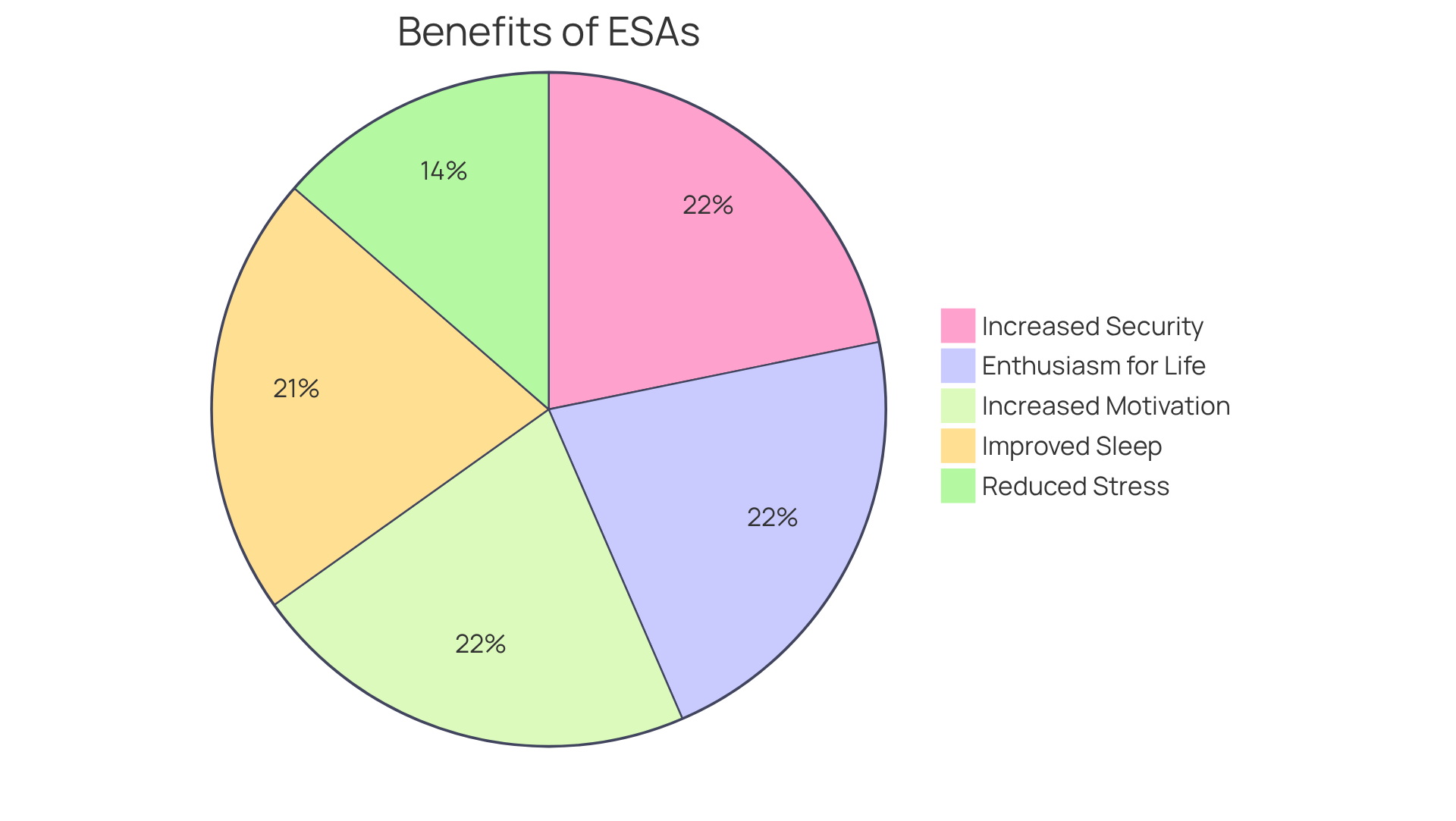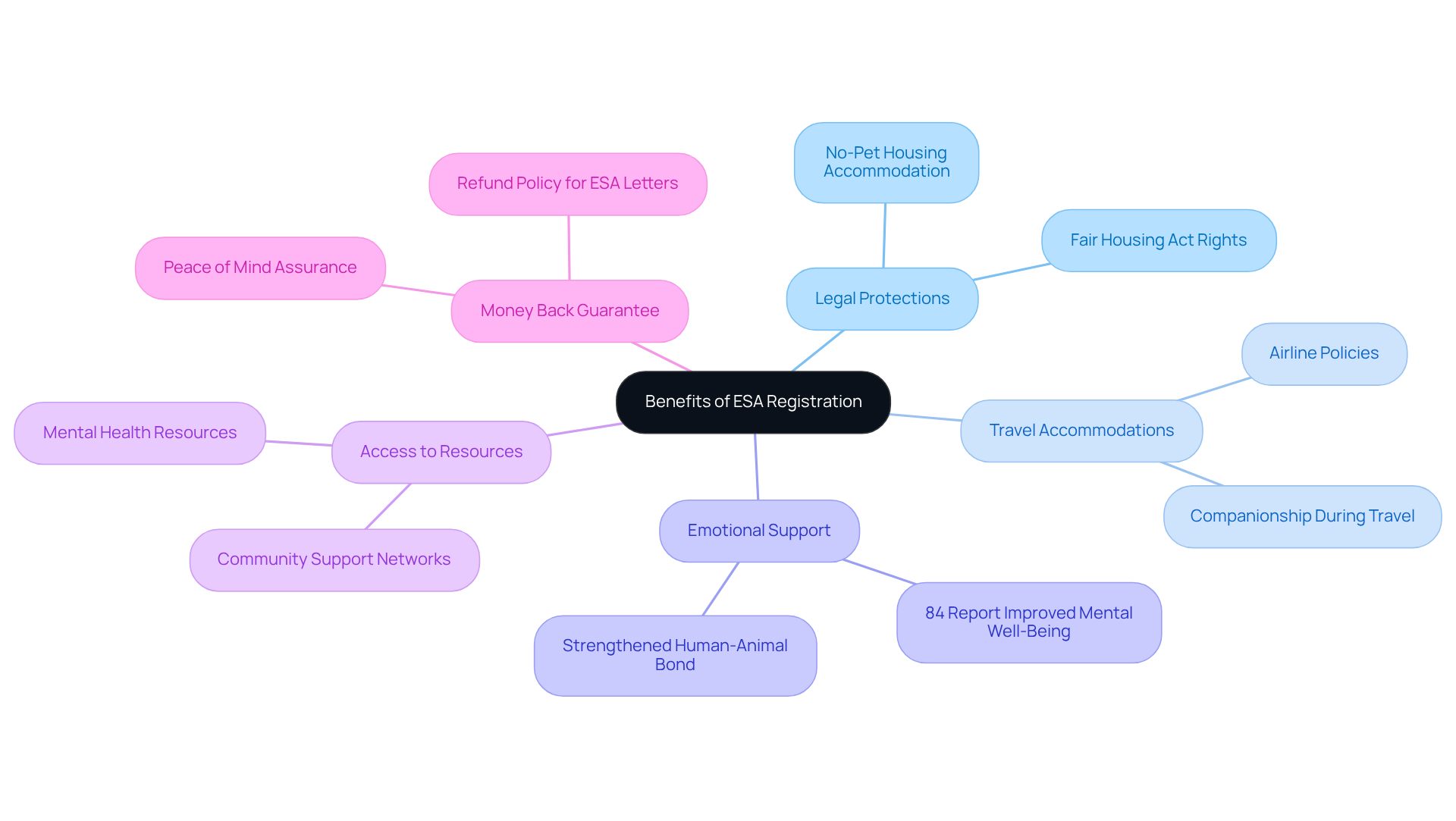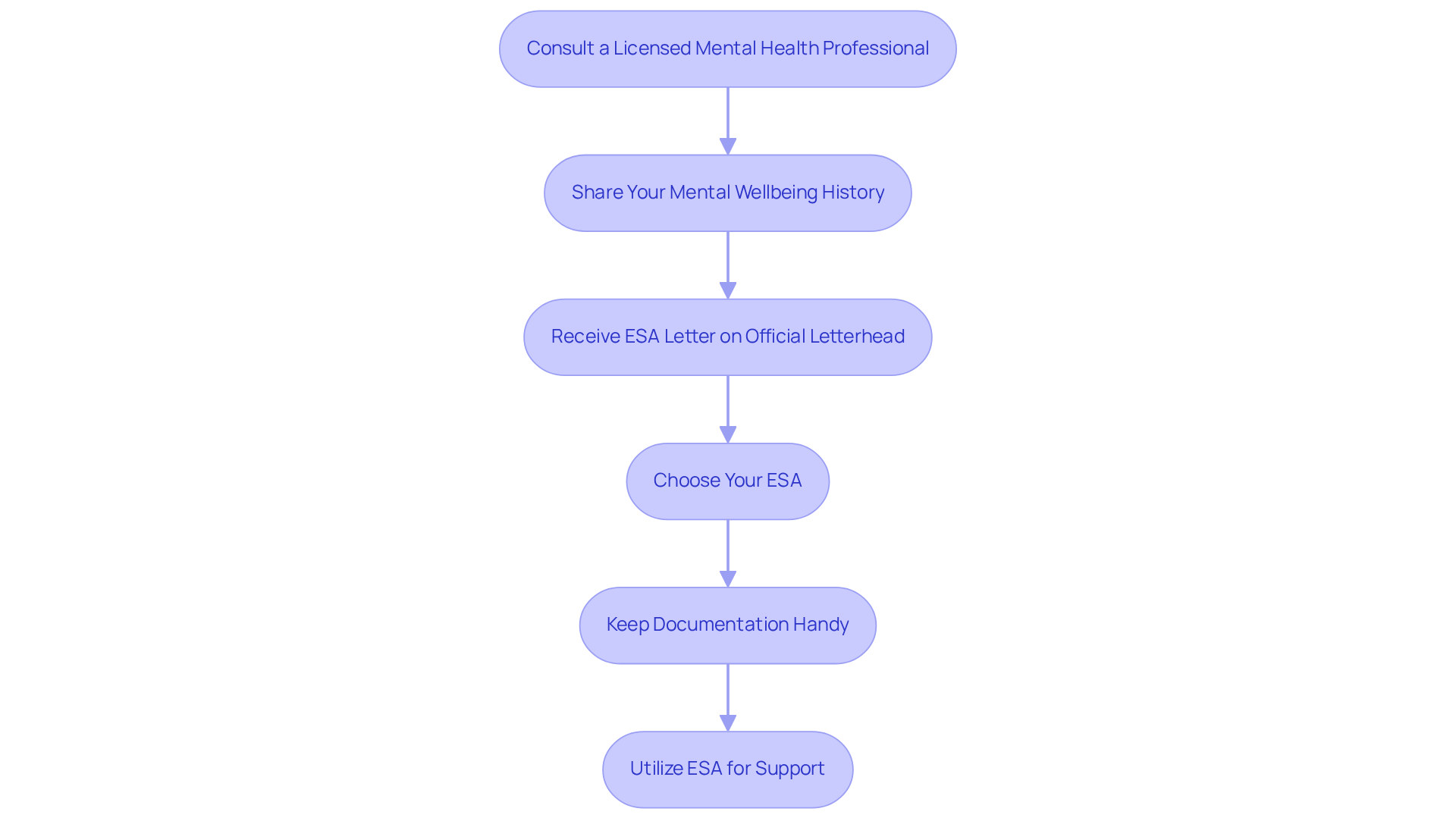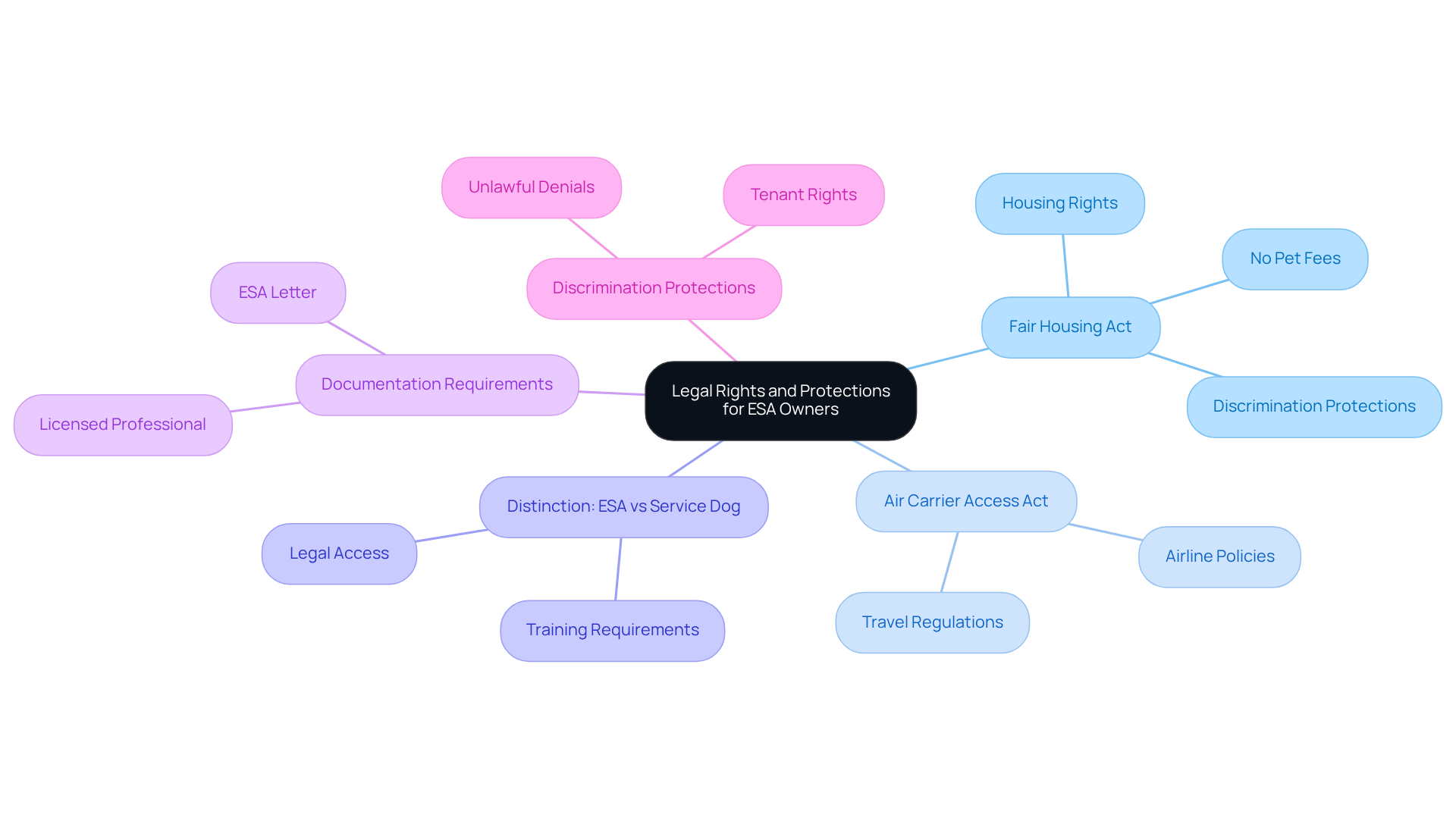

Navigate the ESA Registration Process for Your Emotional Support Animal
by Lena Park
Last updated: September 5, 2025
Verified and Approved by:
Angela Morris,
MSW, LCSW
Fact Checked

Overview
This article highlights the essential steps and benefits involved in the registration process for Emotional Support Animals (ESAs), recognizing their significant role for individuals navigating mental health challenges. It compassionately discusses how registering an ESA not only provides legal protections but also enhances emotional well-being and facilitates access to housing and travel. By doing so, it underscores the transformative impact that ESAs can have on mental wellness, offering a reassuring reminder of the support available to those in need.
Introduction
Emotional Support Animals (ESAs) provide essential comfort and companionship to those navigating the challenging waters of mental health issues, significantly enhancing their quality of life. As awareness of the profound benefits of ESAs continues to grow, so too does the necessity for understanding the registration process that grants these beloved animals their legal recognition and protections. Yet, for many, the journey through the ESA registration process can feel overwhelming, leaving them to question: what are the vital steps to ensure that both the animal and its owner can access the support they truly need?
Define Emotional Support Animals and Their Importance
Support Animals provide essential companionship for individuals grappling with mental health challenges, offering solace and psychological stability. Unlike typical support animals, which are specifically trained to perform tasks, they provide companionship that can significantly alleviate symptoms of anxiety, depression, PTSD, and other psychological hurdles.
For college students navigating psychological distress, support animals can help ease anxiety and depressive episodes during high-pressure situations like exams and assignments, while also addressing feelings of homesickness and isolation. The presence of an ESA registered Emotional Support Animal has been shown to enhance the quality of life; in fact:
- 99.29% of ESA registered owners report an increased sense of security.
- 96.80% experience improved sleep patterns.
- 98.58% of owners with ESA registered animals feel more motivated in their daily tasks.
- 98.93% report a heightened enthusiasm for life, underscoring the profound impact these animals have on overall well-being.
- 62% of owners of ESA registered animals indicate that their pet has significantly reduced their stress and anxiety levels.
The therapeutic benefits of emotional support animals extend beyond mere companionship; they foster a sense of routine and structure, which is crucial for individuals facing mental wellness challenges. As awareness of the importance of support animals grows, those recognized as ESA registered are increasingly seen as vital components of mental health treatment, bridging the gap between psychological difficulties and stability.
Furthermore, under the Fair Housing Act, individuals with emotional support animals possess legal rights that allow them to live with their pets in ESA registered housing that restricts animals, a particularly important consideration for college students exploring housing options.
Have you ever felt the weight of anxiety or loneliness? The companionship of an ESA could be the nurturing support you need to navigate these challenges.

Explore the Benefits of ESA Registration
Registering your Emotional Support Animal can be a transformative step toward enhancing your quality of life, especially if you face emotional challenges with an ESA registered. Many individuals struggle with feelings of anxiety and depression, and finding effective support can be daunting. However, an ESA registered can provide you with the comfort and companionship you need, and the benefits of registration are numerous.
-
Legal Protections: An ESA letter is more than just a piece of paper; it secures your rights under the Fair Housing Act. This means you can live with your ESA registered companion in no-pet housing, free from discrimination. Such legal protections ensure that landlords must accommodate your emotional needs as specified by ESA registered guidelines, allowing you to maintain your vital support system.
-
Travel Accommodations: While emotional support animals do not share the same public access rights as service animals, having an ESA letter can simplify your travel arrangements. Airlines often allow emotional support animals on board, making it easier for you to travel with your companion by your side. This can be especially comforting for those who need companionship during their journeys.
-
Emotional Support: At Wellness Wag, the registration process typically includes a consultation with a licensed medical professional for those who are ESA registered. This not only validates your need for an ESA but also strengthens the bond between you and your animal. Such relationships are crucial for managing emotional challenges, with 84% of ESA owners reporting significant improvements in their mental well-being. One client shared, “Wellness Wag made getting an Emotional Support Animal a breeze. The staff was very supportive and helpful throughout the process.”
-
Access to Resources: Emotional Support Animals that are ESA registered can unlock additional resources and support networks aimed at enhancing mental health. This includes community groups and services that can further assist in your emotional journey. It’s important to note that 70% of pet owners either don’t know how to get their pet certified as ESA registered or assume they don’t qualify, underscoring the need for greater awareness and support.
-
Money Back Guarantee: To ensure a stress-free experience, Wellness Wag offers a Money Back Guarantee. If your legitimate ESA letter doesn’t work for any reason, we will refund your money in full, providing you with peace of mind as you navigate the ESA process.
The importance of these advantages is underscored by the fact that around 200,000 emotional support animals are ESA registered across the country. Additionally, 32% of pet owners have their animals ESA registered. As awareness grows regarding the significance of emotional support animals, so too does the understanding of the legal protections and resources available to their owners. As one Longmont resident beautifully expressed, “She’s helped me feel more grounded and less anxious,” illustrating the profound impact that ESAs can have on emotional well-being.

Navigate the ESA Registration Process: Step-by-Step Guide
Registering your Emotional Support Animal as ESA registered can be a significant step toward enhancing your mental wellness. Here are some essential steps to guide you through this process:
-
First and foremost, consider consulting a licensed mental health professional. Scheduling an appointment with a qualified therapist or psychiatrist is crucial. This expert will take the time to understand your mental wellness needs and determine if an ESA is the right fit for you.
-
During your consultation, be prepared to share your mental wellbeing history. Discussing how an ESA could support you is an important part of this process. The professional will evaluate your situation thoughtfully and may recommend an ESA if they believe it could be beneficial for you.
-
If your mental health specialist deems it appropriate, they will provide you with an ESA letter on official letterhead. This letter is not just a formality; it verifies your need for a support animal and is essential for the legal recognition of your esa registered status.
-
Choosing your ESA is a personal decision. Select an animal that brings you comfort and can provide the support you need. Many people find companionship in dogs, cats, or other domesticated animals.
-
It’s also important to keep your documentation handy. Store your ESA letter securely and be prepared to present it when necessary, such as during housing applications or travel arrangements.
By following these steps, you can ensure that you have the necessary documentation to support your mental health with your esa registered animal. Recent updates in 2025 highlight the growing acknowledgment of Emotional Support Animals in mental wellness care. Consultations are increasingly focusing on personalized support approaches, emphasizing the importance of these discussions. Mental health experts have observed that these consultations can significantly enhance psychological stability and overall quality of life. Remember, you are not alone in this journey, and there is support available to help you thrive.

Understand Legal Rights and Protections for ESA Owners
As an owner of an ESA registered Emotional Support Animal, it’s important to understand your legal rights and protections, especially when navigating the challenges that can arise in housing and travel situations.
The Fair Housing Act is a cornerstone for individuals with disabilities, allowing them to live with their ESAs in housing that may otherwise restrict pets. This law ensures that landlords cannot impose additional fees or deposits for emotional support animals, protecting you from financial burdens that might arise from your need for emotional support.
When it comes to travel, the Air Carrier Access Act plays a significant role. Although airlines are no longer mandated to allow emotional support animals in the cabin, some may still choose to do so. It’s essential to check the specific policies of your airline regarding ESAs before you travel, as these regulations can differ widely.
It’s also vital to understand the differences between emotional support animals and service dogs. Service dogs are specially trained to perform specific tasks and have legal access to public spaces under the ADA. In contrast, while emotional support animals provide crucial emotional comfort and assistance, they do not carry the same legal rights. This distinction is key for owners of ESA registered entities to grasp fully.
Another important point is that, unlike service animals, ESA registered emotional support animals do not require certification or registration with any official body. The only documentation you need is an ESA letter from a licensed mental health professional, which confirms the necessity of having your animal by your side.
You should also be aware that ESA owners are protected from discrimination based on their disability and the need for an ESA. This protection extends to housing situations where pets are typically not allowed, empowering you to advocate for your rights effectively.
Understanding these rights is essential for navigating potential challenges and ensuring that you and your ESA are treated fairly. Remember, you are not alone in this journey; support is available to help you every step of the way.

Conclusion
Emotional Support Animals (ESAs) play an essential role in providing companionship and comfort for individuals facing mental health challenges. The emotional toll of anxiety, depression, and other psychological issues can feel overwhelming. Recognizing the importance of ESAs is vital, as they can alleviate these symptoms and enhance overall well-being. By understanding the ESA registration process, individuals can not only improve their quality of life but also ensure their emotional needs are met.
Throughout this article, we have explored the transformative impact of registering an ESA. Legal protections under the Fair Housing Act, travel accommodations, and access to essential resources are just a few of the benefits that come with this registration. The step-by-step guide provided outlines the necessary actions to secure an ESA letter, highlighting the importance of consulting with a licensed mental health professional. Moreover, understanding the legal rights of ESA owners is crucial for effectively navigating housing and travel challenges.
Ultimately, the journey toward emotional wellness is greatly supported by the companionship of an ESA. By taking the necessary steps to register an emotional support animal, individuals can unlock a range of benefits that significantly enhance their mental well-being. It is essential to advocate for one’s rights and seek the support needed to thrive. Remember, the bond with an ESA can contribute positively to your overall quality of life, bringing comfort and companionship during challenging times.
Frequently Asked Questions
What are Emotional Support Animals (ESAs)?
Emotional Support Animals provide essential companionship for individuals dealing with mental health challenges, offering solace and psychological stability. Unlike trained service animals, ESAs primarily offer companionship that can help alleviate symptoms of anxiety, depression, PTSD, and other psychological issues.
How do Emotional Support Animals benefit college students?
For college students experiencing psychological distress, ESAs can help ease anxiety and depressive episodes during stressful times like exams and assignments. They also address feelings of homesickness and isolation, enhancing overall well-being.
What percentage of ESA registered owners report improved well-being?
The benefits reported by ESA registered owners include: – 99.29% report an increased sense of security. – 96.80% experience improved sleep patterns. – 98.58% feel more motivated in their daily tasks. – 98.93% report a heightened enthusiasm for life. – 62% indicate that their pet has significantly reduced their stress and anxiety levels.
How do ESAs contribute to routine and structure?
Emotional Support Animals foster a sense of routine and structure, which is crucial for individuals facing mental wellness challenges. This regularity can help improve mental health and stability.
What legal rights do individuals with Emotional Support Animals have?
Under the Fair Housing Act, individuals with Emotional Support Animals have legal rights that allow them to live with their pets in housing that would otherwise restrict animals. This is particularly important for college students considering their housing options.
Certify Your Emotional Support Animal Today

Why You Can Rely on Us?
At Wellness Wag, we believe your pet deserves care rooted in both science and compassion. Each article is carefully researched, written in clear language for pet owners, and then reviewed by qualified professionals to ensure the information is evidence-based, current, and practical for real-life care. Our goal is to help you feel confident in making informed decisions about your pet’s health and well-being.
Reviewed by
Angela Morris, MSW, LCSW
Angela is a licensed clinical social worker with 20 years of experience in patient advocacy and community mental health. She has assisted numerous clients with ESA evaluations and brings a deep understanding of disability accommodations, ensuring that all information is accurate, supportive, and practical.

Written by :
Lena Park
Last Updated :
September 5, 2025












